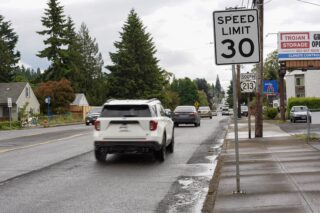
(Photo: J. Maus/BikePortland)
With less than one week left in the 2021 Oregon legislative session there’s one big question Portlanders still don’t have an answer: Will lawmakers choose to spend $80 million to kickstart a long-awaited process that will transfer jurisdiction of 82nd Avenue from the State of Oregon to the City of Portland?
According to Representative Khanh Pham’s Chief of Staff Robin Ye, it could actually happen. Rep Pham was an advocate for 82nd Avenue long before being elected to the House in 2020 and has continued her leadership on the issue from Salem.
Asked for an update on the $80 million request first made back in May, Ye told us via email on Thursday that, “Last we heard it was ‘positive’ about 82nd Avenue and funding will be appropriated for the safety improvements.”
Since the request isn’t part of a legislative bill, it’s impossible for the public to closely track its progress. The money would come from nearly $800 million in federal rescue plan dollars given out by the Biden Administration.
This is a big issue because 82nd Avenue is in urgent need of updates and infrastructure changes that the Oregon Department of Transportation has so far proven incapable of delivering. ODOT manages it like a freeway, yet everyone around the table knows PBOT is much more fit to the task of making it safer and easier to use as the neighborhood collector street it has evolved into — especially for walkers, bikers, and other types of non-drivers.
Advertisement
Following two deaths in April, pressure mounted for the state to make a jurisdictional transfer to the city. This is something both ODOT and PBOT have long wanted, but neither side wanted to foot the $185 million in expenses it would take to bring the road up to a condition Portland felt comfortable with.
That all changed earlier this month when both agencies entered into a transfer agreement. That entire process hinges on whether or not members of the legislature’s Joint Ways and Means Committee decide to allocate that $80 million that would set everything in motion.
Because this is a late-session budget negotiation and this request isn’t part of an official bill, there’s no way for the public to track its progress. Advocates from Oregon Walks and other groups have urged members to send messages to lawmakers urging approval of the funding.
“We believe this will ultimately be fitted in the budget reconciliation bill that will conclude the session,” said Ye with Rep. Pham’s office, “We are optimistic and hopeful we’ll receive the full $80 million.”
— Jonathan Maus: (503) 706-8804, @jonathan_maus on Twitter and jonathan@bikeportland.org
— Get our headlines delivered to your inbox.
— Support this independent community media outlet with a one-time contribution or monthly subscription.



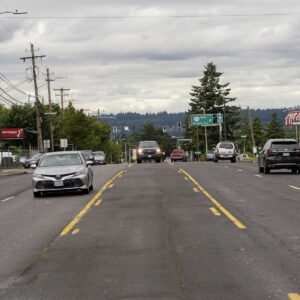
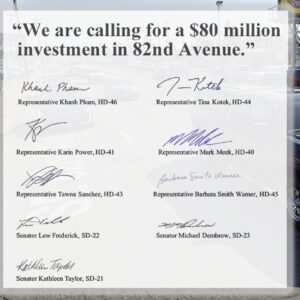
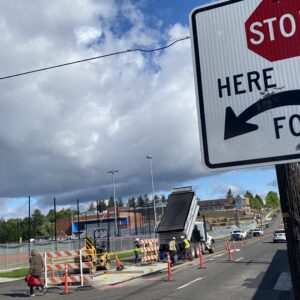
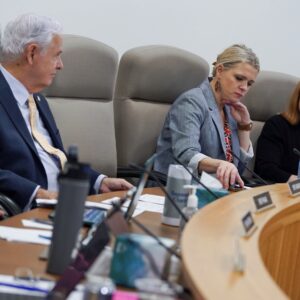
Thanks for reading.
BikePortland has served this community with independent community journalism since 2005. We rely on subscriptions from readers like you to survive. Your financial support is vital in keeping this valuable resource alive and well.
Please subscribe today to strengthen and expand our work.
Shouldn’t it be $82 million? Seems a bit more appropriate.
This is another blatant falsehood relating to ODOT that is easily debunked with any sort of research. 82nd was never a freeway; it’s always been a rural or suburban arterial for pretty much its entire life as a roadway. It’s just now been bypassed as a through route by I-205. I do agree with you that ODOT’s been neglecting it and should have transferred it much earlier, but that’s beside the point. Jonathan, you really really need to stop letting your low opinion of ODOT color your journalism and publishing blatant lies like this.
It’s an orphan highway. I’m using freeway liberally there. I think you are splitting hairs and too concerned with my semantics here just to complete a strong narrative you have about me. I assume readers are smart enough to understand that orphan highway/freeway reference. That being said, thanks for the feedback.
Thanks for being open to feedback. However, the term freeway’s definition is “an expressway with fully controlled access”, in its common usage in the US. That clearly has never been the case for 82nd; it’s not splitting hairs at all. Orphan highway, sure, and a problematic one where I won’t defend ODOT for their handling of it before this point. But freeway, no.
82nd could best be described as a highway. Not so much an avenue, much less an Avenue of Roses.
Tsk tsk Jonathan, how dare you misnoun our streets!
It was known as the “speedway” when it was first built by the county; it was later taken over by the state. It has never been a freeway nor designated as part of the interstate road system.
Before anyone gets any ideas on how to spend the stimulus, I’d suggest reading the intent of the funding and its restrictions: https://home.treasury.gov/policy-issues/coronavirus/assistance-for-state-local-and-tribal-governments/state-and-local-fiscal-recovery-funds
Every dumbfuck community in the country (and even a few smart ones) instinctively go for funding expensive transportation projects, but that’s not really what the funding is for, and there’s so many restrictions that most communities are right now struggling to figure out just what they can spend the money on or cannot, and how fast they must do so before losing out on their allocations. By 2023 the Republicans will control both houses in Washington (even the Democrats concede this), so the funds must be allocated or encumbered by then. They can only be used on shovel-ready projects (i.e. fully designed and engineered, with the NEPA process long past), but not as substitutes for existing federal funding. Adding internet cabling and/or transit connections is a far higher priority for the feds than mere road repair.
Since 82nd is years away from being fully designed and the typical 3-year Oregon NEPA process hasn’t even started yet, I rather doubt it will be eligible for stimulus funding. The $25 billion for highways is chiefly for interstate expansion, so RQ might qualify, but CRC2 is so far away that it likely won’t qualify. Substituting funds with an existing shovel-ready project like outer Powell is looking increasingly unlikely.
Funding Objectives
Treasury is launching this much-needed relief to:
– Support urgent COVID-19 response efforts to continue to decrease spread of the virus and bring the pandemic under control
– Replace lost revenue for eligible state, local, territorial, and Tribal governments to strengthen support for vital public services and help retain jobs
– Support immediate economic stabilization for households and businesses
– Address systemic public health and economic challenges that have contributed to the inequal impact of the pandemic
The Coronavirus State and Local Fiscal Recovery Funds provide substantial flexibility for each government to meet local needs—including support for households, small businesses, impacted industries, essential workers, and the communities hardest hit by the crisis. These funds can also be used to make necessary investments in water, sewer, and broadband infrastructure.
Concurrent with this program launch, Treasury has published an Interim Final Rule that implements the provisions of this program.
Final Rule link: https://www.govinfo.gov/content/pkg/FR-2021-05-17/pdf/2021-10283.pdf
There’s a lot of “ifs” to be had before that actually comes to pass. While gerrymandering will likely result in the House being in GOP control since Manchin and Sinema can’t get past their bipartisan fetish, the Senate actually is leaning towards adding Democrats since they have to defend far less territory.
Regardless, popular public programs are difficult to rescind: see ACA.
This particular one has a built-in Dec 31 2024 deadline to spend the money, so it’s not so much a matter of rescinding as sun-setting the program.
When you get down to it, all districts are Gerrymandered, even before they started blaming Governor Gerry for it, except for those pesky at-large districts. The Republicans control 29 of the state legislatures, so they’ll have more opportunities to redraw districts as census results are released; the Democrats control 17 or 18, the rest have independent commissions to redraw districts, including in mighty California.